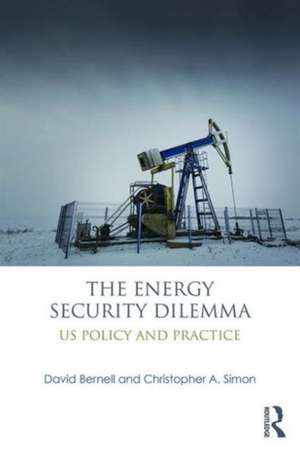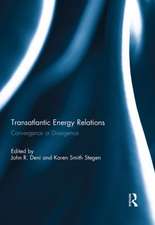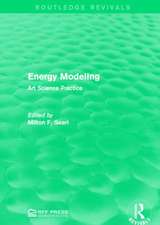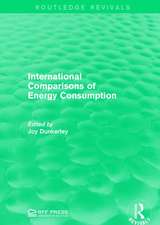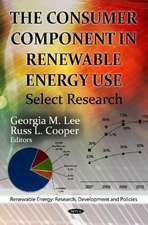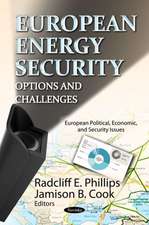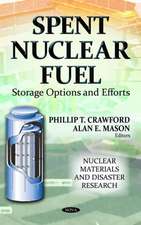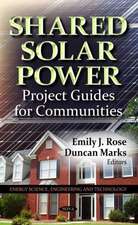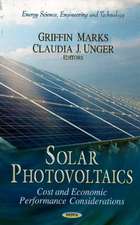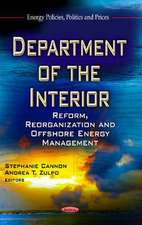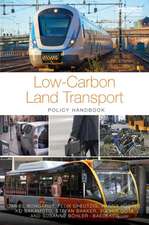The Energy Security Dilemma: US Policy and Practice
Autor David Bernell, Christopher A. Simonen Limba Engleză Paperback – 13 apr 2016
Bernell and Simon examine the current and prospective landscape of American energy policy, from tax incentives and mandates at the federal and state level to promote wind and solar power, to support for fracking in the oil and natural gas industries, to foreign policies designed to ensure that markets and cooperative agreements — not armies, navies and rival governments — control the supply and price of energy resources. They look at the variety of energy related challenges facing the United States and argue that public policies designed to enhance energy security have at the same time produced greater insecurity in terms of fostering rising (and potentially unmet) energy needs, national security threats, economic vulnerability, and environmental dangers.
| Toate formatele și edițiile | Preț | Express |
|---|---|---|
| Paperback (1) | 383.63 lei 6-8 săpt. | |
| Taylor & Francis – 13 apr 2016 | 383.63 lei 6-8 săpt. | |
| Hardback (1) | 1109.18 lei 6-8 săpt. | |
| Taylor & Francis – 12 apr 2016 | 1109.18 lei 6-8 săpt. |
Preț: 383.63 lei
Nou
Puncte Express: 575
Preț estimativ în valută:
73.41€ • 76.64$ • 60.75£
73.41€ • 76.64$ • 60.75£
Carte tipărită la comandă
Livrare economică 04-18 aprilie
Preluare comenzi: 021 569.72.76
Specificații
ISBN-13: 9780415890557
ISBN-10: 0415890551
Pagini: 232
Ilustrații: 10
Dimensiuni: 152 x 229 x 15 mm
Greutate: 0.32 kg
Ediția:1
Editura: Taylor & Francis
Colecția Routledge
Locul publicării:Oxford, United Kingdom
ISBN-10: 0415890551
Pagini: 232
Ilustrații: 10
Dimensiuni: 152 x 229 x 15 mm
Greutate: 0.32 kg
Ediția:1
Editura: Taylor & Francis
Colecția Routledge
Locul publicării:Oxford, United Kingdom
Cuprins
1. Energy Security as a Concept
2. Values, Choices and Needs
3. Private Property Rights and the Public Good
4. Domestic Policy and Energy Transformation: Fossil Fuels
5. Domestic Policy and Energy Transformation: Renewables
6. The International Dimensions of US Energy Security
7. Conclusion
2. Values, Choices and Needs
3. Private Property Rights and the Public Good
4. Domestic Policy and Energy Transformation: Fossil Fuels
5. Domestic Policy and Energy Transformation: Renewables
6. The International Dimensions of US Energy Security
7. Conclusion
Recenzii
PRAISE FOR THE ENERGY SECURITY DILEMMA
A major contribution to the energy security literature. Bernell and Simon are rare boundary-spanners who have been operating at the intersection between the worlds of practice and the academe (Bernell), and between the worlds of science and engineering and social science policy studies (Simon) for over two decades. Energy security policy necessitates a broad range of knowledge and experience, and this book captures the insights generated from this truly collaborative work reflecting a remarkable scope of familiarity with the political, economic and scientific dynamics of energy security.
-- Nicholas Lovrich, Washington State University, USA
An articulate and novel take on energy security both as an analytical concept and as a lens through which to examine the complex dynamics and values affecting energy trends in the United States. Important reading for anybody seriously interested in the future of energy security in the United States, especially those striving to make America’s energy system more environmentally friendly, renewable, and truly secure.
-- Benjamin K. Sovacool, University of Sussex, UK
Bernell and Simon have crafted an engaging and thoughtful examination of energy security that both captures the 20th-Century geopolitical roots of the topic and ties them to the emergent needs of the globalized 21st-century. It’s a brave volume that isn’t afraid to tackle incongruence and contradiction, with candor and insight, in one of the central political conflicts of our era.
-- Adam L. Reed, University of Colorado-Boulder, USA
A major contribution to the energy security literature. Bernell and Simon are rare boundary-spanners who have been operating at the intersection between the worlds of practice and the academe (Bernell), and between the worlds of science and engineering and social science policy studies (Simon) for over two decades. Energy security policy necessitates a broad range of knowledge and experience, and this book captures the insights generated from this truly collaborative work reflecting a remarkable scope of familiarity with the political, economic and scientific dynamics of energy security.
-- Nicholas Lovrich, Washington State University, USA
An articulate and novel take on energy security both as an analytical concept and as a lens through which to examine the complex dynamics and values affecting energy trends in the United States. Important reading for anybody seriously interested in the future of energy security in the United States, especially those striving to make America’s energy system more environmentally friendly, renewable, and truly secure.
-- Benjamin K. Sovacool, University of Sussex, UK
Bernell and Simon have crafted an engaging and thoughtful examination of energy security that both captures the 20th-Century geopolitical roots of the topic and ties them to the emergent needs of the globalized 21st-century. It’s a brave volume that isn’t afraid to tackle incongruence and contradiction, with candor and insight, in one of the central political conflicts of our era.
-- Adam L. Reed, University of Colorado-Boulder, USA
Descriere
This book analyzes the energy security of the United States – its ability to obtain reliable, affordable, and sufficient supplies of energy, while achieving environmental sustainability and enhancing energy independence. The economic and national security of the United States is largely dependent upon fossil fuels, especially oil. Without significant changes to current practices and patterns of energy production and use, the domestic and global impacts – security, economic, and environmental – are expected to become worse over the coming decades. Growing US and global energy demands need to be met and the anticipated impacts of global warming must be avoided – all at an affordable price.
